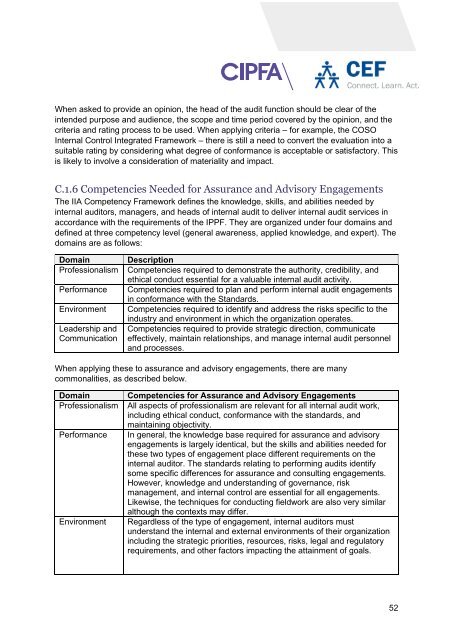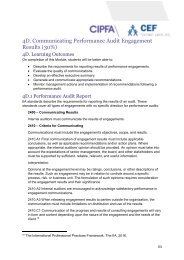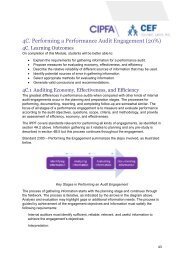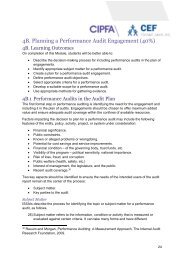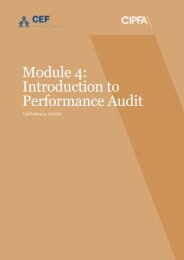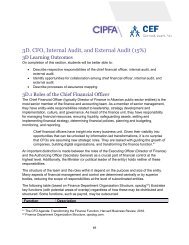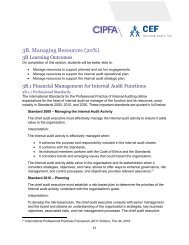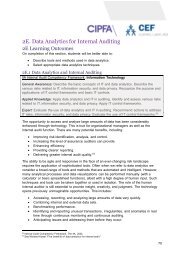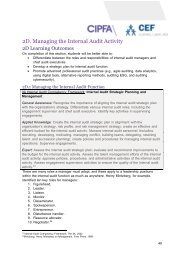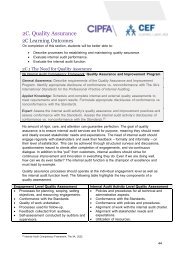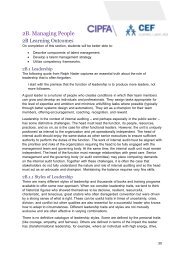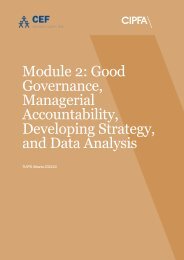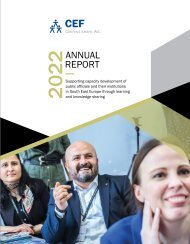TIAPS Module 1 Audit and Assurance workbook
You also want an ePaper? Increase the reach of your titles
YUMPU automatically turns print PDFs into web optimized ePapers that Google loves.
When asked to provide an opinion, the head of the audit function should be clear of the<br />
intended purpose <strong>and</strong> audience, the scope <strong>and</strong> time period covered by the opinion, <strong>and</strong> the<br />
criteria <strong>and</strong> rating process to be used. When applying criteria – for example, the COSO<br />
Internal Control Integrated Framework – there is still a need to convert the evaluation into a<br />
suitable rating by considering what degree of conformance is acceptable or satisfactory. This<br />
is likely to involve a consideration of materiality <strong>and</strong> impact.<br />
C.1.6 Competencies Needed for <strong>Assurance</strong> <strong>and</strong> Advisory Engagements<br />
The IIA Competency Framework defines the knowledge, skills, <strong>and</strong> abilities needed by<br />
internal auditors, managers, <strong>and</strong> heads of internal audit to deliver internal audit services in<br />
accordance with the requirements of the IPPF. They are organized under four domains <strong>and</strong><br />
defined at three competency level (general awareness, applied knowledge, <strong>and</strong> expert). The<br />
domains are as follows:<br />
Domain<br />
Professionalism<br />
Performance<br />
Environment<br />
Leadership <strong>and</strong><br />
Communication<br />
Description<br />
Competencies required to demonstrate the authority, credibility, <strong>and</strong><br />
ethical conduct essential for a valuable internal audit activity.<br />
Competencies required to plan <strong>and</strong> perform internal audit engagements<br />
in conformance with the St<strong>and</strong>ards.<br />
Competencies required to identify <strong>and</strong> address the risks specific to the<br />
industry <strong>and</strong> environment in which the organization operates.<br />
Competencies required to provide strategic direction, communicate<br />
effectively, maintain relationships, <strong>and</strong> manage internal audit personnel<br />
<strong>and</strong> processes.<br />
When applying these to assurance <strong>and</strong> advisory engagements, there are many<br />
commonalities, as described below.<br />
Domain<br />
Professionalism<br />
Performance<br />
Environment<br />
Competencies for <strong>Assurance</strong> <strong>and</strong> Advisory Engagements<br />
All aspects of professionalism are relevant for all internal audit work,<br />
including ethical conduct, conformance with the st<strong>and</strong>ards, <strong>and</strong><br />
maintaining objectivity.<br />
In general, the knowledge base required for assurance <strong>and</strong> advisory<br />
engagements is largely identical, but the skills <strong>and</strong> abilities needed for<br />
these two types of engagement place different requirements on the<br />
internal auditor. The st<strong>and</strong>ards relating to performing audits identify<br />
some specific differences for assurance <strong>and</strong> consulting engagements.<br />
However, knowledge <strong>and</strong> underst<strong>and</strong>ing of governance, risk<br />
management, <strong>and</strong> internal control are essential for all engagements.<br />
Likewise, the techniques for conducting fieldwork are also very similar<br />
although the contexts may differ.<br />
Regardless of the type of engagement, internal auditors must<br />
underst<strong>and</strong> the internal <strong>and</strong> external environments of their organization<br />
including the strategic priorities, resources, risks, legal <strong>and</strong> regulatory<br />
requirements, <strong>and</strong> other factors impacting the attainment of goals.<br />
52


